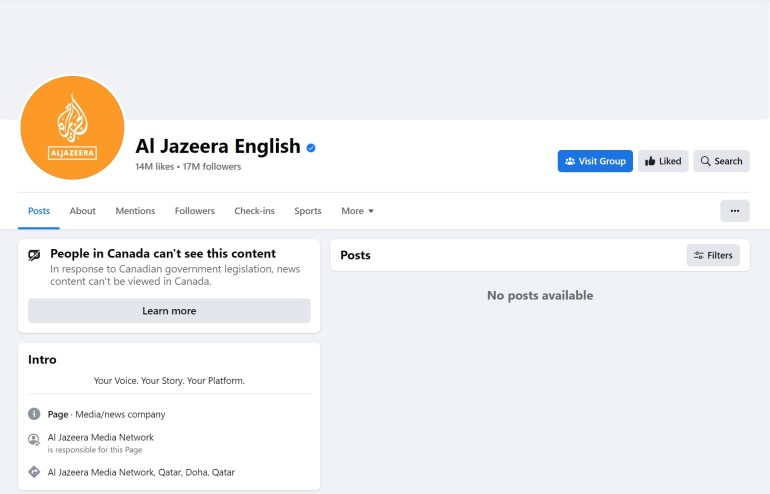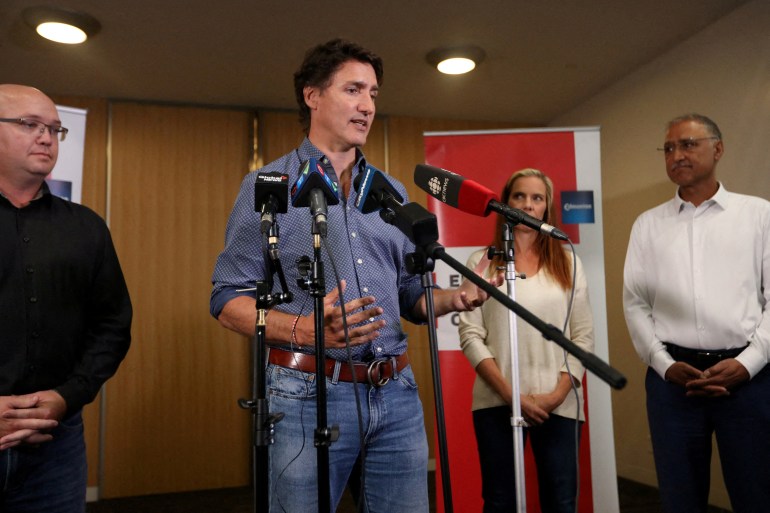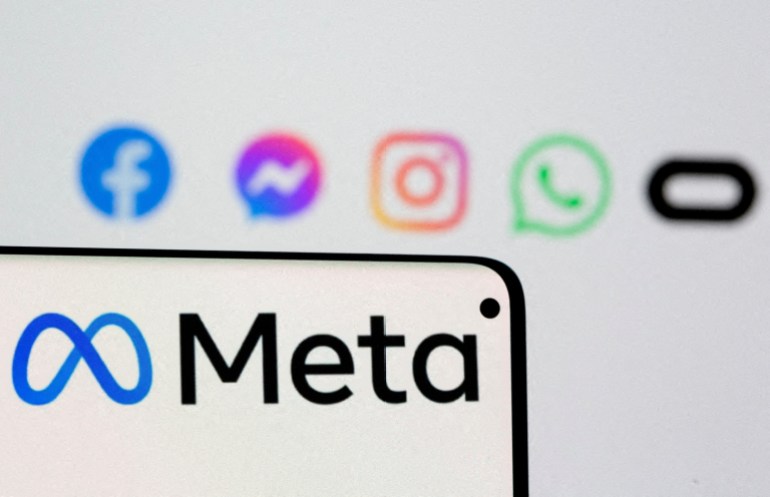As fires raged in Canada’s huge Northwest Territories earlier this month, officers rushed to evacuate tens of hundreds of individuals earlier than the flames might attain the capital of Yellowknife.
A citywide evacuation deadline loomed and making certain residents had entry to correct info relating to emergency flights, highway closures and momentary shelters was actually a matter of life and dying.
But regardless of pleas from politicians and journalists, Meta – the proprietor of common social media websites Fb and Instagram – refused to carry its block on information in Canada, elevating alarm and anger throughout the nation of greater than 40 million folks.
“The ban remains to be a silly and harmful factor,” Ollie Williams, editor of the Yellowknife-based Cabin Radio, instructed Al Jazeera.
Williams mentioned that though folks have been capable of attain the information outlet’s content material and discover methods across the ban, together with by posting screenshots of articles, in the course of the peak of the wildfires, Meta’s coverage stays unjustifiable.
“It shouldn’t be in place – definitely not proper now,” he mentioned.
The legislation
In June, the Canadian Parliament handed the On-line Information Act, requiring social media firms to share income with media shops that share their content material on the platforms.
The federal government mentioned the legislation, which doesn’t go into impact till the tip of the yr, was a part of a push to assist the struggling Canadian media trade. It requires voluntary industrial agreements between massive digital platforms – corresponding to Fb and Google – and information shops, however permits Ottawa to step in if such offers aren’t reached.
Digital platforms responded forcefully to the laws, with Google calling it a “hyperlink tax” and threatening to cease that includes Canadian information web sites in its search and different platforms when the legislation comes into power.
Meta went a step additional: It imposed a Canadian information blackout starting on August 1, successfully blocking Fb and Instagram customers in Canada from having the ability to see information articles on the platforms or to submit hyperlinks themselves.
“The laws relies on the inaccurate premise that Meta advantages unfairly from information content material shared on our platforms, when the reverse is true,” the corporate mentioned in a press release in June.
The Canadian authorities slammed Meta’s place and Prime Minister Justin Trudeau extra not too long ago decried the choice to keep up the block in the course of the Yellowknife evacuations as “inconceivable”.

“Fb is placing company income forward of individuals’s security,” Trudeau mentioned final week.
However the firm has refused to again down in a standoff that raises difficult questions on whether or not social media platforms have tasks to society, what position governments have in regulating them, and what the long run is for journalism within the digital age.
Consultants instructed Al Jazeera that the deadlock ought to push information shops to rethink their reliance on social media to achieve audiences and propel policymakers to search out methods to help native journalism.
“There may be a lot hazard in changing into too dependent upon these massive platforms as core elements of your online business mannequin and your operations; it makes you structurally susceptible,” mentioned Dwayne Winseck, a professor of media research at Carleton College in Ottawa.
Supporters of the legislation additionally say it goals to right a skewed relationship between information shops and social media web sites, the place journalists do the arduous work however massive platforms get the lion’s share of digital promoting.
The Canadian authorities has reported that greater than 450 information shops have closed throughout the nation over the previous 15 years whereas at the least one-third of journalism jobs have disappeared since 2010.
“As Meta and Google have been consolidating their grip on internet advertising and the web distribution and sharing of reports, journalists and journalism have been present process a disaster,” Winseck instructed Al Jazeera.

Meta responds
In response to complaints in the course of the latest Canadian wildfires, Meta has touted Fb’s “Security Verify”, which permits folks to mark themselves as “secure” throughout emergencies by a so-called “disaster response” web page and request help if wanted.
An organization spokesperson instructed Al Jazeera in an e mail this month that the Security Verify system additionally permits Fb customers to “entry updates from respected sources” in occasions of disaster.
“Folks in Canada can proceed to make use of our applied sciences to attach with their communities and entry respected info, together with content material from official authorities companies, emergency companies and non-governmental organizations,” the spokesperson mentioned.
However Fb’s disaster response web page for the Northwest Territories wildfires incorporates largely video content material, together with from obscure and non-Canadian information shops.
And critics have mentioned the wildfires in Yellowknife and different elements of Canada highlighted Meta’s uncompromising stance. Brent Jolly, president of the Canadian Affiliation of Journalists (CAJ), mentioned Meta’s “entrenchment” displays badly on the corporate.
“It definitely – for me – speaks volumes about their dedication to disseminating high quality info [and] serving their customers,” Jolly instructed Al Jazeera.
For his half, Williams at Cabin Radio mentioned he tried to achieve out to Meta for a personal dialog, however he has not obtained a response.
He mentioned he doesn’t essentially help the brand new legislation, noting that it was largely backed by massive media organisations with out session with smaller shops. “However I additionally assume it’s fairly unconscionable to maintain the ban in place when it wouldn’t have an effect on them to quickly carry it,” Williams mentioned.
‘Caught within the internet’
It’s troublesome to totally assess how Meta’s determination affected the wildfire evacuation effort.
However Winseck mentioned the information blackout disrupts “the chain of knowledge circulate” inside a group as a result of persons are reduce off from these inside their social circles whom they belief to submit credible information and knowledge.
Emilia King, an assistant professor in communication and digital media research at Ontario Tech College, cautioned that the ban might additionally result in a resurgence of on-line misinformation – an issue Canada and plenty of different international locations are already grappling with.
“The Canadian residents, they’re struggling; they’ve been caught up within the internet of this large battle,” King instructed Al Jazeera.
“We’ve turn into accustomed to those platforms virtually as in the event that they’re public utilities. However clearly, they’re not. They’re non-public firms. They’ve confirmed time and time once more that they put their very own pursuits first,” she mentioned.
A number of consultants mentioned Meta is drawing a line to make sure that different international locations don’t observe go well with and attempt to regulate the platform. “It’s like serving garlic to a vampire,” King mentioned of social media firms’ aversion to authorities rules.
There’s a precedent to the scenario in Canada.
In 2021, Fb blocked information content material in Australia in response to an analogous draft legislation. The ban lasted simply days, nonetheless, as the federal government amended the proposal to offer social media platforms extra time to strike industrial offers with media shops earlier than intervening.
The laws finally handed. In December 2022, the Australian authorities hailed it as a “success”, saying that media shops signed greater than 30 offers to compensate them for information featured on Google and Fb.

The Australian legislation finally enabled the federal government to use the code the place it noticed match. That, in flip, gave social media platforms an opportunity to indicate that they’re contributing to the “sustainability of the Australian information trade” and be spared necessary arbitration.
However the applicability of Canada’s legislation is broad, consultants say, and it has already handed. Furthermore, the Canadian Radio-television Telecommunications Fee (CRTC), which oversees media rules, has not finalised the foundations on how the laws will likely be carried out.
Winseck mentioned the On-line Information Act doesn’t set clear standards for who is roofed by the rules and who will not be. “We should always have very clear thresholds as a result of with out these clear thresholds, it seems just like the laws was particularly made to harpoon Google and Fb,” he mentioned.
Rethinking information
Because the impasse persists, Winseck mentioned Canadian media shops ought to rethink their method and reliance on social media to achieve audiences.
He referred to as for “imaginative steps” to make up for the lack of attain from Meta and probably Google in Canada, and instructed one among his personal: An mixture information service by CBC, the general public broadcaster, that may function content material from shops throughout Canada.
For his half, Jolly, the pinnacle of CAJ, mentioned information shops ought to remind their audiences of the significance of journalists’ work and invite them to eat the information straight from the supply.
“It’s necessary for information organisations and impartial journalists … to essentially emphasise that, ‘Hey, we’re those who’re on the entrance traces,’” he mentioned.
